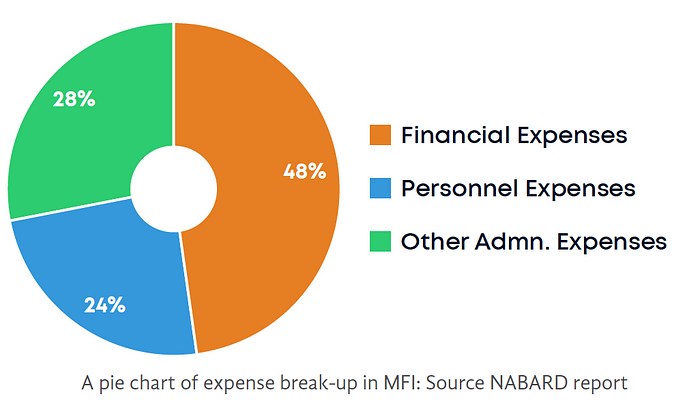Cognitochain — Decentralized Platform for Microfinance
Introducing Cognitochain — Decentralized Platform for Microfinance

Hello, world!! We are excited to announce Cognitochain. Cognitochain’s mission is to provide access to credit for millions of unbanked/underbanked people around the world. To realize our vision, we are building an open platform based on Blockchain technology that powers existing and startup Non-banking financial institutions with cutting edge technology that is built on the foundations of Privacy, Security and Immutability.
This is first in a series of posts about Congnitochain’s vision, Current state of the microfinance industry and the key problems we have set as our mission to solve.
Microfinance and The Unbanked:
Microfinance institutions (MFIs) are financial institutions working towards the upliftment of the needy and underprivileged low-income families of the society by providing short-term loans to set up their own venture. They take a minimum or very calculated risk and fund the interested borrowers to help them get trained, set up and run a small-scale business. Microfinance institutions apart from giving financial help also educate people about the current market trends and help them compete in the present market. These financial institutions usually do not take any guarantee or ask for any kind of collateral from the borrower to lend money. This is where these institutions stand out from the traditional banking organizations. While banks are quite reluctant about lending money to the poor unemployed segment considering them as high-risk components, MFI’s are especially dedicated to providing all the necessary financial help to this section of the society. These organizations not only take the risk of funding them but also work with them to ensure that the offered money gets utilized appropriately. They contribute in every possible way to uplift the under-banked/unbanked section and make them financially independent.
The Indian Scenario :
The Indian Microfinance Sector has witnessed phenomenal growth over the past 18 years. The number of institutions providing microfinance services has gone up from a few to several hundred. The quantum of credit made available to the poor and financially excluded clients has reached USD 6.6 billion and the number of clients benefitted crossed 29 million as of March 2017 without the data of 6 large sized MFIs who converted to Small Finance Banks before April 2017. The SHG (Self Help Group) bank linkage program has equally grown to touch the lives of individuals through SHGs with an outstanding loan portfolio of USD 8.8 billion.

The Government of India and the Reserve Bank of India have created conducive policy and regulatory framework for Microfinance Institutions (MFIs) to operate in the country. This has provided the necessary legitimacy and impetus to the sector. MFIs, in general, comply with the regulations, take care of client protection issues and adhere to the Industry Code of Conduct. These factors go a long way in infusing confidence among all the stakeholders. Last year the sector had to face certain issues when two high denomination currency notes were demonetized. This put challenges in the recovery efforts of the institutions. Though in the short term these developments have indeed affected the sector, they have displayed enough resilience to carry on with our activities to achieve the goal of financial inclusion.
Three areas deserve special attention.
The Need for articulating the fact that microfinance is a strategic part of the financial inclusion agenda of the government and that of the central bank.
The criticality of re-demonstrating collective intention to help the poor, low income population and the unbanked populace by way of having the right mission, social performance measures and client protection processes.
We are able to project the fact that microfinance institutions are sustainable financial institutions and they continue to be the investible destination for the bankers and the investors.
Technology as an Enabler
Technology is the main driver for process efficiency and cost optimization. More and more MFIs have imbibed technology but many of them are operating in silos without having an integrated technology solution for the entire process end-to-end from customer on-boarding to appraisal to sanction/disbursement and recovery. This is a great opportunity for Fin-Tech companies providing cutting edge technology solutions. After demonetization many of the MFIs have faced significant issues in some cases disbursements have declined by more than 50% due to lack of liquidity. This clearly shows MFI’s depend hugely on cash transfers for disbursements and collections. While MFI’s are moving from physical cash disbursement & recovery to bank accounts, This is another great opportunity for Fin-Tech players to build innovative digital payment solutions leveraging technologies like India’s UPI (Unified payment interface). Robust Credit Appraisal and using the appropriate method for assessing creditworthiness brings in the much-needed risk containment and delinquency management. Herein again there is a great opportunity available for technology service providers to bring in robust credit appraisal mechanism and high-quality credit scoring methodology.
About Cognitochain:
Cognitochain Technologies Pvt Ltd. is working with Telangana State Govt of India, to onboard their flagship low-cost credit provider — Stree Nidhi onto Cognitochain blockchain platform for MFI’s.
About Stree Nidhi :
StreeNidhi credit cooperative Federation Ltd. is promoted by the Government of Telanaga to supplement credit flow from the banking sector and is a flagship programme of the Government. StreeNidhi provides timely and affordable credit to the poor SHG members as a part of the overall strategy of SERP for poverty alleviation, with a loan portfolio of $400 Million, serving 2 Million unbanked women.
More info:
https://twitter.com/cognitoChain
